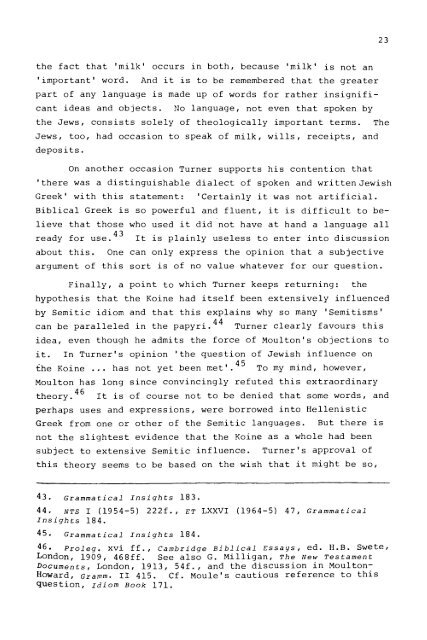A Lexical Study of the Septuagint Version of the Pentateuch
A Lexical Study of the Septuagint Version of the Pentateuch
A Lexical Study of the Septuagint Version of the Pentateuch
You also want an ePaper? Increase the reach of your titles
YUMPU automatically turns print PDFs into web optimized ePapers that Google loves.
<strong>the</strong> fact that 'milk' occurs in both, because 'milk' is not an<br />
'important' word. And it is to be remembered that <strong>the</strong> greater<br />
part <strong>of</strong> any language is made up <strong>of</strong> words for ra<strong>the</strong>r insignifi<br />
cant ideas and objects. No language, not even that spoken by<br />
<strong>the</strong> Jews, consists solely <strong>of</strong> <strong>the</strong>ologically important terms. The<br />
Jews, too, had occasion to speak <strong>of</strong> milk, wills, receipts, and<br />
deposits.<br />
On ano<strong>the</strong>r occasion Turner supports his contention that<br />
'<strong>the</strong>re was a distinguishable dialect <strong>of</strong> spoken and written Jewish<br />
Greek' with this statement: 'Certainly it was not artificial.<br />
Biblical Greek is so powerful and fluent, it is difficult to be<br />
lieve that those who used it did not have at hand a language all<br />
4 3<br />
ready for use. It is plainly useless to enter into discussion<br />
about this. One can only express <strong>the</strong> opinion that a subjective<br />
argument <strong>of</strong> this sort is <strong>of</strong> no value whatever for our question.<br />
Finally, a point to which Turner keeps returning: <strong>the</strong><br />
hypo<strong>the</strong>sis that <strong>the</strong> Koine had itself been extensively influenced<br />
by Semitic idiom and that this explains why so many 'Semitisms'<br />
can be paralleled in <strong>the</strong> papyri.^ Turner clearly favours this<br />
idea, even though he admits <strong>the</strong> force <strong>of</strong> Moulton's objections to<br />
it. In Turner's opinion '<strong>the</strong> question <strong>of</strong> Jewish influence on<br />
4 5<br />
<strong>the</strong> Koine ... has not yet been met . To my mind, however,<br />
Moulton has long since convincingly refuted this extraordinary<br />
<strong>the</strong>ory.^ It is <strong>of</strong> course not to be denied that some words, and<br />
perhaps uses and expressions, were borrowed into Hellenistic<br />
Greek from one or o<strong>the</strong>r <strong>of</strong> <strong>the</strong> Semitic languages. But <strong>the</strong>re is<br />
not <strong>the</strong> slightest evidence that <strong>the</strong> Koine as a whole had been<br />
subject to extensive Semitic influence. Turner's approval <strong>of</strong><br />
this <strong>the</strong>ory seems to be based on <strong>the</strong> wish that it might be so,<br />
43. Grammatical Insights 183.<br />
44. NTS I (1954-5) 222f., ET LXXVI (1964-5) 47, Grammatical<br />
Insights 184.<br />
45. Grammatical Insights 184.<br />
46. Ρ Γ Ο , ρ σ . xvi ff., Cambridge Biblical Essays, ed. H.B. Swete,<br />
London, 1909, 468ff. See also G. Milligan, The New Testament<br />
Documents, London, 1913, 54f., and <strong>the</strong> discussion in Moulton-<br />
Howard, Gramm. II 415. Cf. Moule's cautious reference to this<br />
question, Idiom Book 171.

















